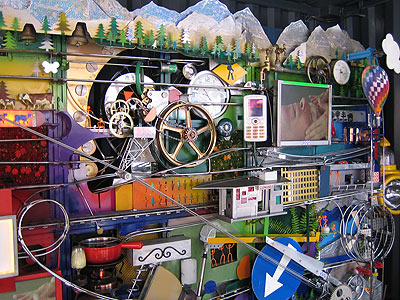The Producers vs. The Product
Published on March 30th, 2010 in: Editorial, Music |Adding his voice to the multitudes of musicians clamoring to be heard, Duran Duran’s John Taylor proposed that the Internet is stifling creativity during a speech he gave at UCLA’s 40th Anniversary Of The Internet Symposium.
Although he feels that the Internet “has brought more music from more places and more eras, into the hearts and minds of us all” and even though he “applaud[s] anything that can inspire interest or curiosity in anyone,” he still thinks this exposes a “lack of need for current culture” and perhaps has caused “innovative culture to slow down.”

Máquina de Rube Goldberg en la base del Alinghi © freshwater2006
This speech, which was published in abridged form on the BBC News website, has met with both praise and criticism, some of it stemming from the idea that as a member of a mainstream pop group, Mr. Taylor has no business complaining about this sort of thing.
Yet avant-garde composer and musician Glenn Branca echoed a similar sentiment within in a blog post he wrote for the New York Times, titled somewhat alarmingly, “The End Of Music.” Branca wonders “if in fact the new music is just the old music again.”
For his part, John Taylor claims it isn’t just the overexposure to music, but the overexposure to musicians (i.e., via Twitter), that “dilutes” their creativity and “durability” as well as the “magical power and magnetic attraction they can or will ever have over their audience.” Tom Meighan, singer for award-winning pop group Kasabian, agrees, saying the Internet (via Twitter) has “killed off the myth of the rock star.”
Bono—certainly a mainstream, global rock star—concurs, but with the caveat that the destruction is financial. The LA Weekly blog pointed out that U2’s manager, Paul McGuinness, has been a pivotal figure in Bono adopting such a stance.
Global corporation Warner Brothers has also supported this “financial” analysis. In February of this year, Warner announced it would no longer allow its music catalog to be streamed online.
But what about the common people, the ones who listen to and purchase the music that made all these folks so well-known? In the comments section of the Yahoo! UK article about Warner Brothers, at least two people say that they will buy music if they hear it online first and like it. Only two people, perhaps, but I challenge any music fan reading this piece to deny they’ve said or heard the same kind of thing from at least two or more people they know personally.

A Poptimist article about cassette culture evokes ideas similar to John Taylor’s, noting that “[i]nstant access to almost any recording has left some of us over-stimulated, endlessly consuming without really digesting what we hear.” MP3s are guilty of eliciting “knee jerk reactions,” says Mike Sniper of cassette label Captured Tracks (and a musician). Not having to buy something means you don’t have to listen to it if you don’t like it right away. Sniper thinks this trend is “really sad, because when I got into music as a kid, I had to at least try everything out for a while and I never liked most of it at first.”
As someone who straddles the line between common and celebrity, copyright activist and author Cory Doctorow addresses the idea of “try before your buy” with regards to his own written work: “Of all the people who fail to buy my books today, the majority do so because they’ve never heard of them, not because someone gave them a free e-book.” He also thinks Bono should just “shut up” about financial destruction because he’s “made more money off touring than any other band this year.”
One wonders what such a polemic present means for the future. In response to Marc Hogan’s Poptimist piece, Freaky Trigger’s Tom Ewing penned a futuristic editorial written in March 2022, adding fuel to the fires ignited by Taylor, Branca, Meighan and others. A character named “Chantal Fielding” remarks that with all this information, “for music, that means there’s no mystery anywhere.” Another character, “Cursor Daly,” laments that “music ought to be larger than life, inescapable. . . but now the people who make it don’t even matter, it’s just about which of your friends are into it and then you forget it the week after.”
Yet for Brian Eno, the future may not be so stifling. “A way to make new music is to imagine looking back at the past from a future and imagine music that could have existed but didn’t. . . [my] interest in making music has been to create something that does not exist that I would like to listen to, not because I wanted a job as a musician.” So is the death of creativity nothing more than suicide?
Whether the music itself is on cassette, CD, or MP3 might be irrelevant; it could be a question of who is calling the shots. According to an interview conducted with activist and author Jerry Mander in 2004, technology is never neutral: “The automobile and oil industries conspired [in the 1930s] to destroy the commuter railroads and replace them with freeways. Now people are wondering about what to do with all the cars. They’re studying how to put trains back on the bridge again.”
Music has long been accused of being nothing than a product sold by the big corporations. However, I’ll let Tom Ewing’s fictional “Reece Maclay” have the last, sobering word:
“CDs started to die when people stopped wanting to pay for a product, and then social media and music streams came along and let people stop paying for it all legally, and the product vanished. But when you can’t see what the product is and someone’s still making money, then the product is you.”
— Less Lee Moore, Managing Editor
7 Responses to “The Producers vs. The Product”
March 30th, 2010 at 10:20 pm
I still buy music… probably TOO MUCH music! But in fact, one of my favorite bands, The Residents, I first heard by downloading a song of theirs (“Constantinople” from Duck Stab) — and now I own the whole catalog, inlcuding just about all the various expensive limited edition CDs, a whole pile of T-shirts and gee-gaws, and well, most anything else with an eyeball on it. And all that I wouldn’t have spent if I’d not download that song.
And I also, if I’m really hankering for a new album, will go out of my way to NOT download it — I like the whole sitting down with the liners ritual. Like, I’m REALLY excited for the new Goldfrapp record, but I can’t afford it right now (payday is tomorrow, yay)… and despite lots of friends being all “You want it? Here!” (Basically with “I know you’re going to buy it anyway” as the sometimes un-but-sometimes-explicitly-spoken subtext.)
And, well, as usual, Eno is god.
March 31st, 2010 at 11:01 am
Thanks for weighing in. I am very similar to you in that I will also buy something (a LOT of things) if I like it enough and want to support the musician/band in question.
We bought Electric Six’s entire catalog from iTunes and then went and bought all the hard copy CDs so we could have the liner notes.
LLM
March 31st, 2010 at 1:25 pm
Interesting to hear this from John Taylor (who has been consistently underestimated as a thinker and intellectual just because he’s in a band that teenage girls liked once). For some people, the mythic aspect of “rock star” means more than it does to someone like me, who is much more interested in the mechanics, the specifics, and the psychology of the music I listen to. Music was never aspirational to me; it was (and still is) more religious. And while, yeah, having to make a serious effort to acquire the music I wanted does make a certain impact on how I then feel about that music, it doesn’t matter as much as the actual music. I enjoyed the Sloan B-sides album just as much as a download as I would have if I bought it in a shop (or from the band at the show, like I had originally planned). The music itself is now a part of my consciousness; it doesn’t matter how I got it.
Also, I’m poor, so I don’t buy music as much as I’d like. But I try to always lay down money for the artists I truly care about. On that note, the new Gorillaz album is tits.
March 31st, 2010 at 1:54 pm
At first blush, I thought the JT speech was brilliant, but now I sort of think he sounds stodgy. I’ve said similar stuff before, but I feel a little bit less jealous of my own musical upbringing these days, I suppose.
I do feel, however, that there is something to be said for the restriction aspect; not because it dilutes the rock star mythos, but because some people seem to think if they have the Internet and can find anything, they know everything. Then they write reviews for albums and don’t even bother to use their precious Internet. But I’ve bitched about this elsewhere, so I’ll stop now.
LLM
April 9th, 2010 at 9:43 pm
Re: Taylor – what a weird way to put it. I think what he’s noticing is this:
Flip to the 60s station on XM radio. You don’t even have to look to tell what decade you’re listening to, right? Flip to the 70s hits. Yep, there’s a certain sound there too. You can spot an 80s hit within seconds, whether you’ve heard it before or not.
Now listen to a pop hit from 2001 and a pop hit from 2010. Oh my god. Yep. Mainstream musical evolution (production styles, etc) stopped dead in its tracks the minute the labels started investing far less in long-term relationships and started holding their cards closer than ever for surer investments. Nobody wants to find “the new sound” in the mainstream anymore because frankly, it’s an expensive search and a gamble that’s hard to justify. File under sad but true. That’s why we turn to independent music for our gourmet meals.
April 10th, 2010 at 10:25 am
Very well put, Adam!
LLM
January 30th, 2011 at 10:46 pm
[…] is the affect of all of this? Almost a year ago, I talked about this situation, and opened my own editorial with a reference to a speech given by Duran Duran’s John Taylor, one in which he argued that […]
Time limit is exhausted. Please reload the CAPTCHA.